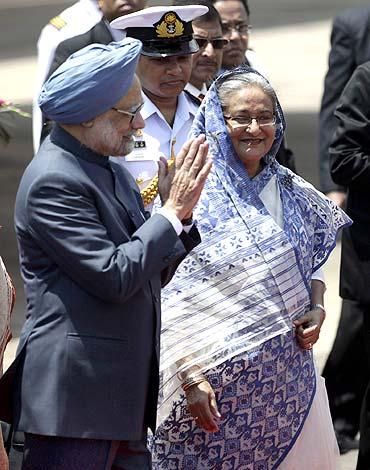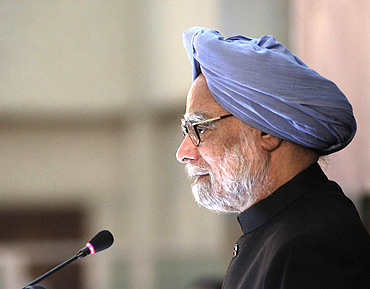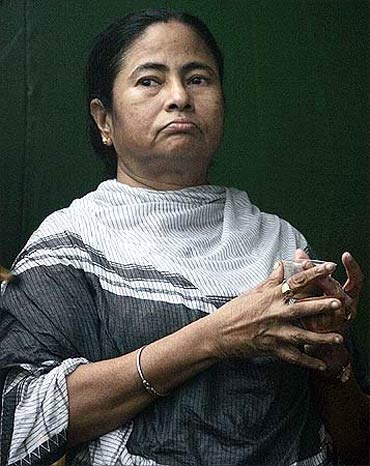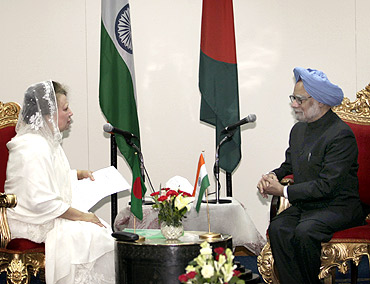 | « Back to article | Print this article |
A visit that failed to achieve its promise
If India fails to swiftly capitalise on the propitious political circumstances in Bangladesh today, it will be damaging its credibility in the region even further, says Harsh V Pant.
It was being touted as the visit that would shift paradigms and mark a historic change in the trajectory of India's relations with Bangladesh. In the end Prime Minister Manmohan Singh's visit to Dhaka did nothing of the sort.
The Indian prime minister was visiting Dhaka to take forward the process of restoring credibility to Delhi-Dhaka ties initiated by his Bangladeshi counterpart during her visit to New Delhi in July 2010.
Singh's visit came 12 years after former Prime Minister Atal Bihari Vajpayee visited Dhaka in 1999. High profile visits including by Sonia Gandhi, the all-powerful leader of the ruling Congress Party, the external affairs minister and home minister had preceded the prime minister's visit, laying the groundwork for a possible historic shift in Delhi-Dhaka ties.
When Bangladesh's Prime Minister Sheikh Hasina had visited New Delhi in 2010, she decided to go for a big gamble by putting all outstanding issues on the table and making it clear that Dhaka was a serious partner of New Delhi in counter-terror operations and an economic bridge between India and its north-eastern region.
Please click NEXT to read further...
PM's visit fell much short of expectations
New Delhi tried seized this opportunity and decided to give Hasina's offers substantive weight by deciding to open Indian markets for Bangladeshi textiles and offering to resolve the dispute over the sharing of the waters of the Teesta and Feni rivers.
Boundary issues have also been moving towards some sort of a resolution as the two sides move ahead in resolving the issues of small enclaves in each other's territory.
Insurgents operating in Indian's north-east have tended to find a safe haven in Bangladesh for some decades now but the Hasina government has taken a hardline against them, satisfying one of India major long-standing demands.
India, for its part, has also given strong instructions to its Border Security Force against shooting unarmed Bangladeshi civilians along the border areas even if they were found crossing the borders illegally.
By restoring trans-border connectivity via the northeast, India and Bangladesh will be laying the groundwork for larger regional economic integration involving Nepal, Bhutan and Myanmar.
And as the prime minister was about to make his maiden voyage to Bangladesh, it was being suggested India's eastern neighbourhood stood on the threshold of a remarkable transformation.
However, Manmohan Singh's visit fell much short of expectations. The two states did sign the landmark agreement on the demarcation of land boundary and exchange of adversely held enclaves, thereby settling the decades-old vexed border issue.
India-B'desh summit came very close to collapsing
Singh also announced 24-hour access to Bangladeshi nationals through the Tin Bigha corridor besides duty-free access to 46 textile items with immediate effect.
India also declared that it would be helping Bangladesh develop its ports and infrastructure as well as customs points and would supply bulk power to Bangladesh by connecting our national grids.
But Bangladesh was not satisfied as a last-minute scrapping of Teesta water sharing deal because of the objections raised by West Bengal Chief Minister Mamata Banerjee on the draft of the agreement left a bad taste and if not resolved soon might provide ammunition to anti-India elements in Bangladesh.
A clarification was sought from the Indian envoy by the Bangladesh foreign ministry as to why India decided not to sign the treaty at the very last minute. The India-Bangladesh summit meeting came very close to collapsing.
Sheikh Hasina's visit had imparted a new direction to the course of Delhi-Dhaka ties. And Bangladesh has been rightly upset at the slow pace in the implementation of deals signed during Hasina's visit.
Hasina has taken great political risk to put momentum back in bilateral ties. But for long there was no serious attempt on India's part to settle outstanding issues. Bureaucratic inertia and lack of political will was preventing many of the deals in getting followed through.
As India failed to reciprocate fully to Hasina's overtures, the main opposition in Dhaka, the Bangladesh Nationalist Party started using India-Bangladesh bonhomie under Hasina to attack the government for toeing India's line.
Bangladesh remains deeply divided
India-Bangladesh ties had reached their lowest ebb during the 2001-2006 tenure of the BNP government. The BNP and its fundamentalist allies remain opposed to normalisation of Delhi-Dhaka ties and have demanded that all bilateral deals be made public first.
The country remains deeply divided.
India is the central issue around which Bangladeshi political parties define their foreign policy agenda. This should not be a surprise given India's geographic, linguistic, and cultural linkages to Bangladesh.
Over the years political parties opposing the Awami League have tended to define themselves in opposition to India, in effect portraying Awami League as India's 'stooge'.
Moreover, radical Islamic groups in Bangladesh have tried to buttress their own Islamic identity by attacking India.
In India too, various constituencies have stymied the Delhi-Dhaka rapprochement.
The prime minister was to be accompanied by the chief ministers of five states bordering Bangladesh. But Mamta Banerjee, chief minister of West Bengal, decided not to go at the very last minute, expressing her disapproval of the final draft of the Teesta river water agreement. Domestic textile producers in India have been lobbying hard to resist opening up of Indian markets more fully to Bangladeshi goods.
India can't afford to ignore Dhaka
There is no doubt that India as the larger economic power should be magnanimous towards its neighbours. India remains fixated on its western border but there is very little that India can do to change the regional dynamic there.
It is India's eastern neighbour that India should focus on and go the extra mile. If India fails to swiftly capitalise on the propitious political circumstances in Bangladesh today, it will be damaging its credibility in the region even further.
New Delhi's window of opportunity with Dhaka will not exist forever. Anti-Indian sentiments can be marginalised if India allows Bangladesh to harness its economic growth and present it with greater opportunities. Yet India remains overly obsessed with Af-Pak and has failed to give due attention to its eastern frontier with Bangladesh.
India is witnessing rising turmoil all around its borders and therefore a stable, moderate Bangladesh as a partner is in its long-term interest. Constructive Indo-Bangladesh ties can be a major stabilising factor for the South Asian region as a whole. It can't afford to ignore Dhaka.
The prime minister's visit to Dhaka had the potential to start a new era in much troubled Delhi-Dhaka ties, thereby being a game-changer in South Asian geo-politics and geo-economics. Domestic political imperatives ensured that it didn't quite work out that way.
Yet Delhi should persevere and try to resolve water issues at the earliest with Dhaka so as not to lose the momentum set by Sheikh Hasina's big gamble on India.




